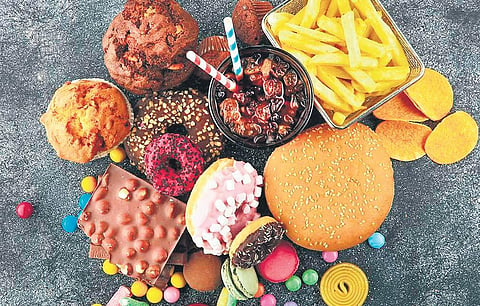

BENGALURU: Today’s children are bombarded with enticing advertisements promoting unhealthy foods that are high in saturated fatty acids, trans-fatty acids, free sugars, and/or salt (HFSS). Recently, the World Health Organisation (WHO) introduced guidelines to protect children from products that promote unhealthy food and non-alcoholic beverages. Accordingly, doctors in Bengaluru have also opined that such advertisements should be restricted during children’s shows and should not include child actors in promotions.
Commercials strategically placed on social media, and even in schools, exert a powerful influence on children and significantly shape their dietary preferences. Basavaraja GV, president of the State Paediatric Association Karnataka, said, “In the last three years, children have become addicted to junk food and packaged food items, which give instant energy and cause obesity, leading to early metabolic syndrome.” He added that cases of cholesterol, blood pressure and heart attacks have increased in children.
“Even after 10 years of WHO’s recommendations, children continue to be exposed to powerful marketing of HFSS foods and non-alcoholic beverages, consumption of which is associated with negative health effects,” the body’s recent statement read.
Parents in the city want their children to eat healthy, however, advertisements on packed food such as chips, aerated drinks, and fried items encourage children to force their parents to buy these products.
“Whenever there is a particularly enticing advertisement about food, especially chocolates, chips, and milkshakes, my son’s immediate response is I want to eat this now. He fixates on one item for weeks,” said Pinky Jain, mother to an 8-year-old.
Experts say that the government needs to release strict guidelines for schools all over Karnataka to restrict junk food. Dr Shivaprakash Sosale, Assistant Professor, Paediatrics, Bangalore Medical College, said, “ The school environment itself allows all kinds of junk and packaged food items that attract children. All fried foods like samosas and vadas can be avoided and healthier substitutes can be offered, however, very little action is taken in this issue.”
Ads focused on cash
Experts said that parents play a crucial role in purchasing these products and should not give into their children’s demands. Shruthi V Shetty, Assistant Professor of Manipal Institute of Communication, said, “Expecting brands to do something would be too idealistic. They are here for business; therefore, they would focus on creating more profits. A proper platform for providing information could lead to a better understanding of the harmful effects of such products.”